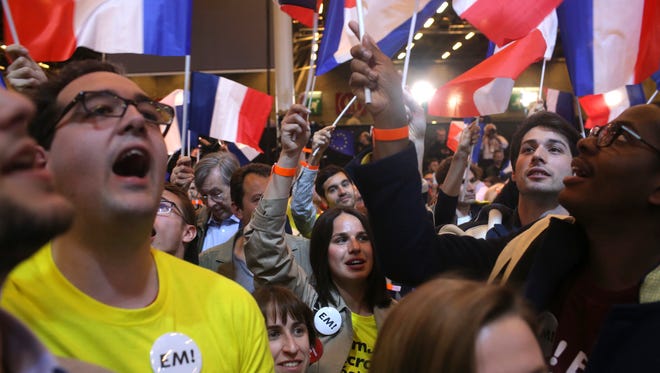Far-right Le Pen, centrist Macron advance to French presidential runoff

PARIS — Far-right anti-immigration nationalist Marine Le Pen and centrist independent Emmanuel Macron will advance to a showdown for president of France that will determine whether the nation stays the course or upends European unity and its liberal immigration policies, estimates of first-round voting Sunday showed.
The election was a historic repudiation of major party candidates, who quickly rallied around Macron ahead of the the May 7 runoff to prevent the election of Le Pen, who wants to ban Muslim immigration and pull France out of the European Union it helped found 60 years ago.
With 89.7% of the vote counted, Macron has 23.7% and Le Pen 21.9%. They are followed by conservative Francois Fillon, with 19.9% and far-left candidate Jean-Luc Melenchon with 19.2%, the Associated Press reports.
Le Pen said Sunday her National Front party will represent “the great alternative” to the French people.
Fillon conceded defeat but Melenchon refused to step aside until votes from France's cities, where he and Macron draw much of their support, had been counted.
“The time has come to free the French people,” Le Pen said at her election day headquarters in the northern French town of Henin-Beaumont.
Macron and Le Pen have vastly different visions for how to govern France, and of French identity.
Le Pen wants to pull the nation out of the EU and close the country's borders to new immigrants. Macron has broken with France's traditional left or right political leadership to run as an independent and promised to invest in public infrastructure and modernize France's workforce.
Macron said in a speech to his supporters that France was going through a unique moment in its history and said that if elected he would govern on behalf of all French patriots. Macron has never held elected office and his independent On the Move party did not even exist a year ago.
Protesters angry about Le Pen's results scuffled with police. Crowds gathered on the Place de la Bastille, and police fired tear gas to disperse an increasingly rowdy gathering as riot officers surrounded the area.
French Prime Minister Bernard Cazeneuve urged voters to support Macron in next month's final round, as did defeated conservative candidate Fillon.
“Extremism can only bring unhappiness and division to France. As such, there is no other choice than to vote against the extreme right,” he said.
Marion Abonnenc, 21, a student in Paris, said she was "satisfied" and "relieved" that her choice among the candidates is pulling ahead.
"I support Macron but also voted against the extremes which I really don't want to see in the second round," she said. "Marine Le Pen has a heinous message which really doesn't correspond to my values as a youth as a citizen of the world. And it's not the image of France I want to convey."
At Le Pen's campaign base 120 miles north of Paris, Jerome Leroy, 34, an entrepreneur, was ecstatic over the results.
"I'm very happy with the results, it's well done, it's a good thing," he said. "We managed to get the others out of the picture already, only one candidate remains: Emmanuel Macron who in fact will bring nothing more than (president) François Hollande does today. So now the real debate can start and we are happy about it — it's awesome."
Unpopular Socialist President François Hollande did not run for re-election, unusual for an incumbent French leader.
Voters chose between 11 candidates in the most unpredictable French election in decades and came amid heightened security in the wake of a terrorist attack in central Paris on Thursday in which a police officer was shot and killed.

France's stagnant economy, its 10% unemployment rate and national security concerns topped concerns for the 47 million eligible voters. France has been under a state of emergency since the November 2015 terror attacks in Paris and there has been a steady drip of terrorism incidents in France over the last few years.
About 60,000 police and soldiers were deployed across the country to secure polling stations for Sunday's vote.
President Trump told the Associated Press on Friday that he was not officially endorsing Le Pen but he thought the attack on Thursday would "probably help" her because she is the candidate who is "strongest on borders, and she's the strongest on what's been going on in France."
On Sunday, Trump tweeted that there was a "very interesting election currently taking place in France."
Jabeen Bhatti reported from Paris; Kim Hjelmgaard contributed from London.